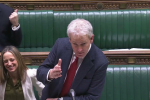This morning I joined a briefing for MPs on the situation in Afghanistan, with ministers from the Foreign Office, Ministry of Defence and Home Office, senior commanders from the British Army, and our Ambassador in Kabul. MPs were unanimous in praising our staff, civilian and military, both at home and in Afghanistan, for their work supporting the evacuation of British nationals, Afghans who have helped our forces over the years, and others at risk of the Taliban.
This great work is distinct from the political decisions that have led to the crisis, which are perhaps less praiseworthy. I am sure that President Biden is right to say that leaving Afghanistan was always going to be messy. But the precise mess we are in - an immediate crisis at Kabul International Airport (KIA) which has already seen people die in the crush, a longer-term humanitarian diaster looming, an increased terrorist threat, and an earthquake in global politics that has damaged the western alliance and emboldened our rivals, principally China and Russia - was surely not inevitable. I join those MPs from all parties who want to know why western intelligence was so poor that the Taliban’s sudden victory this month was not anticipated or planned for, and what consultation and agreement took place between the US and UK governments and armed forces ahead of the withdrawal.
Some important points made by ministers, commanders and the Ambassador this morning:
- The evacuation operation is now running more smoothy and at a greater scale than a few days ago, and government expects that all people eligible for the ARAP scheme (i.e. Afghans who have helped our forces) will be called forward to enter the airport today.
- The challenge at KIA is not air capacity - there are as many planes flying in and out each day as the airport can handle - but the capacity of the troops and officials at the perimeter to process the people for admittance to the airport. This confirms what I am hearing from people on the ground who have been in touch for help.
- One reason for the difficulties at the perimeter is the need to keep out the bad guys. There is a real risk that terrorists will be attempting to join flights to the UK. This is why we can’t just fling open the gates to anyone who wants to get on a plane.
- The Taliban continue to facilitate the exit of people through their checkpoints, but some people are not getting through, and it is risky for anyone to break cover and head for the airport.
- So while the operation in the airport is better, the challenge for people getting to the airport remains intense, and is arguably worsening as the window for evacuation closes. It appears unlikely that the Taliban will tolerate an armed western presence in the country beyond 31 August - unless they can be persuaded, perhaps by China or Russia, to do so - and anyway we await a decision from Washington on whether the US wishes to remain beyond that date anyway; without them, apparently, British forces will be unable to stay.
- While the Taliban are, so far, maintaining peace in Kabul and not attacking western forces, there is a real danger of other groups, notably Daesh or Isis, who have a presence in the country and are said to be planning attacks either on western forces, on the Taliban, or on the Afghan people.
I hope this is helpful information for people worrying about loved ones, or simply about the unfolding humanitarian crisis, in Afghanistan. As I say, there are wider questions to be answered about the decisions that led us here.
Separately I am in discussions with Wiltshire Council and the MOD about housing Afghan evacuees in the county, and I hope I can provide an update on that soon.





